Hapoel Be'er Sheva F.C.
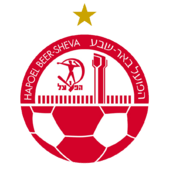 | |||
| Full name |
Hapoel Be'er Sheva Football Club מועדון הכדורגל הפועל באר שבע | ||
|---|---|---|---|
| Nickname(s) | The Camels (הגמלים) | ||
| Short name | HBS | ||
| Founded | 1 May 1949 | ||
| Ground | Turner Stadium, Beersheba | ||
| Capacity | 16,126 | ||
| Owner | Alona Barkat | ||
| Chairman | Asi Rahamim | ||
| Manager | Barak Bakhar | ||
| League | Israeli Premier League | ||
| 2015–16 | Israeli Premier League, 1st | ||
| Website | Club home page | ||
|
| |||
| Departments of Hapoel Be'er Sheva | ||
|---|---|---|
| |
|
|
| Football | Basketball | Volleyball |
| |
|
|
| Handball | Swimming | Judo |
Hapoel Be'er Sheva Football Club (Hebrew: מועדון הכדורגל הפועל באר שבע, Moadon HaKaduregel Hapoel Be'er Sheva) is an Israeli football club from the city of Beersheba, that competes in the Israeli Premier League. The club was founded in 1949, and since 2007 it is run by businesswoman Alona Barkat. The club also includes youth groups, teens and children, and football schools.[1]
The home uniform colors of the club are red and white. Until 1959, the club played its home games at the stadium that was located in the ancient city of Beersheba. In 1960, the club moved to the Vasermil Stadium. Starting from the 2015–16 season, the home ground of the team is the Turner Stadium.
The club won its first league title in 1975. Over the years, the team has won three league titles, three Toto Cups (one in the National League), three Super Cups (one in the second division) and one Lilian Cup.
History
Early years
Hapoel Be'er Sheva were formed in 1949 by Zalman Casspi. Casspi's ambition was to build a successful team full of talented young players.
The clubs first game was against a team from Mefalsim, a Kibbutz, in Southern Israel. The Mefalsim team was mostly made up of immigrants from South America. The game was played in a stadium in Be'er Sheva's "Old City" and ended in a 5–4 victory for Hapoel.
At this time Hapoel played in a league with only four other clubs. Hapoel drew their games against Hapoel Rishon LeZion, Hapoel Kfar Saba and Hakoah Ramat Gan. In their other game against Hapoel Ramat Gan Be'er Sheva lost 4–3.
In 1952, the club disbanded, but were re-established 3 years later and were granted entry into the Liga Gimel.
In the 1956/57 season, the team finished top of the league under new manager Yosef Azran. In their final game of the season, they played against Jaffa, winning 5–0, a win which gained them promotion to Liga Bet
Following the clubs promotion to Ligament Bet, they appointed Lonia Dvorin as their new manager. In the first season, they finished a respectable second place, however, a 5–0 defeat against Hapoel Afula in the opening game of their second season in Ligament Bet, signalled the end of Dvorin's reign as manager and he was replaced by Jack Gibbons, who had previously managed Hapoel Petah Tikva to five national titles as well as being the head coach of the Israel National team
In the first game under Gibbons, they played against ZVI Single, Hapoel however, felt that ZVI had played illegally and reported them to the league, which resulted in Hapoel winning the points. In the second game against Maccabi Sha'arayim Hapoel won 2–0. The final game against Hapoel Natanya a 2–1 win for Be'er Sheva granted them promotion to Liga Alef.
In 1958/59 Jack Gibbons left the club and was replaced by Yehiel Moore, who brought in some experienced players such as Shmuel Admon, Eliyahu Offer and Moris Hanegbi. In 1959/60 the team moved to a new stadium and invited Cypriot side Anorthosis Famagusta to officially open the stadium, the Cypriot side won the game 2–1.
1960s
At the beginning of the 1960s the team did not try to promote to a higher league and finished in 9th place in 1960–61. But in 1961–62 the club decided to bring in a foreign coach, Rober Eryol.
Eryol was the only Jewish player who played at the same time in Turkey national team. They began very badly after five games. The management decided to fire Eryol and to bring back Yehiel Moore.
The results got better and Be'er Sheva reached to State Cup semifinals after unbelievable victory against Hapoel Tel Aviv in the quarter-final, but lost to Maccabi Tel Aviv in semi-finals.
In 1963–64 Be'er Sheva battled against Beitar Tel Aviv and tried to be promoted to the first league. Before the end of the season Hapoel Ramla played against Be'er Sheva in her new stadium. Ramla went on 1–0 lead, but a few minutes later Be'er Sheva equalized and before the end of the game the referee gave a penalty to Be'er Sheva. As a result, the players of Ramla began to beat team members of Hapoel Be'er Sheva because they remembered a miserable defeat that took place only a year before. Be'er Sheva won 9–0. The Israeli Football Association decided to punish Ramla and gave Be'er Sheva a technical victory. Because of the decision Ramla gave on purpose a critical game to Beitar Tel Aviv the main rival of Be'er Sheva and therefore Beitar was promoted to the Israeli Premier League.
In 1964–65 the Yugoslavian coach Slavko Milošević came to Be'er Sheva. In the first day of the league, Be'er Sheva played an away game against Ramla and beat them 6–0. As the league continued Be'er Sheva battled with Beitar Jerusalem and Beitar Ramla. One game before the end of the season, Be'er Sheva made history and promoted to the first league after an away victory against Hapoel Ashkelon.
The success gave the Yugoslavian coach Slavko Milošević one more year. So that year 1965–66 the games were played in home-away system. The first game was against Hapoel Petah Tikva who won. In the second game Be'er Sheva won. In that year Be'er Sheva avoided a relegation after a home game against Maccabi Netanya. Be'er Sheva won 4–0.
In the beginning of 1966 the Israeli Football Association decided to extend 1966 to two years 1966–1968. In the first round Be'er Sheva defeated Maccabi Tel Aviv 2–0 with two goals from their young player Meir Barad with more than 8000 fans in her stadium. In the second year Be'er Sheva and Maccabi Tel Aviv meet again, it was Rafi Eliyahu's first appearance at the first team. During the game he scored and Be'er Sheva won 3–0. Be'er Sheva finished in 9th place.
In 1968–69 Be'er Sheva avoided relegation because Hapoel Tel Aviv beat Maccabi Sha'arayim.
In 1969–70 Be'er Sheva was relegated to a lower league Although Abraham Menchel one of the premier coaches and a former Maccabi Haifa player came.
1970s
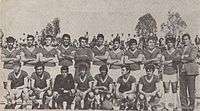
In 1970–71 Be'er Sheva returned to the first league after only one year of absence. Be'er Sheva took first place and Meir Barad became the top scorer of the Second League. By the end of the year Be'er Sheva, the best team of the south second division, played against Maccabi Jaffa the north second division. The game went to overtime and Be'er Sheva won with a penalty shootout.
In 1972–73 and 1973–74 Be'er Sheva played an Offensive football but because of a weak defense the team finished 5th and 7th.
First championship

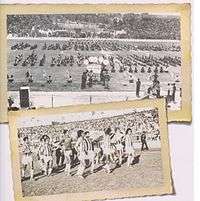
| “ |
I think Be'er Sheva is going to take the championship, |
” |
| — original lyrics to Shlomo Scharf, from Book – 40 years of sport in the Negev | ||
In 1974–75, 37 years old Amatsya Levkovich became Be'er Sheva's coach. He was one of the youngest coaches in the state and was the first that bring the attacking defenders to the pitch. He took it from the German football. Before the beginning of the season, Amatsya replaced his defense with two young players. 18 years old Uri Benjamin as a right defender and Jacob Cohen as a left defender. Be'er Sheva started with Three victories against Beitar Tel Aviv, Maccabi Petah Tikva and Maccabi Netanya. After the game against Hapoel Kfar Saba in day 14. Her coach Shlomo Scharf said:
The championship was decided on day 29. Be'er Sheva played against Maccabi Jaffa and won 1–0 meanwhile Maccabi Netanya lost to Hapoel Haifa and Be'er Sheva for the first time won the national championship. The main players were: the goalkeeper Ronnie Moscovic. Defenders like: Uri Benjamin, Jacob Cohen, Alon Ben Dor. Midfielders like: Meir Barad, Eliyahu Offer and the striker Abraham Noma. The main thing was that all the squad came from the youth department of Be'er Sheva except the goalkeeper Ronnie Moscovic.
Before 1975–76 Be'er Sheva played against cup winners Hapoel Kfar Saba for the Super Cup. Be'er Sheva won 2–1.
Second championship
| “ |
we showed only 50% of our ability, but like a winning team. |
” |
| — original lyrics to Alon Ben Dor, from Book – 40 years of sport in the Negev | ||
In 1975–76 Shalom Avitan returned to Hapoel Be'er Sheva after two years. In the beginning Be'er Sheva drop points against Maccabi Tel Aviv and Beitar Jerusalem.
in this year Be'er Sheva fought Beitar Jerusalem to win the championship. In the final day of the season Be'er Sheva had a crucial game against Maccabi Jaffa who had to win to avoid relegation. Be'er Sheva need a draw to win the championship, in the other game Beitar Jerusalem played against Maccabi Tel Aviv that try to avoid relegation. Be'er Sheva hosted Maccabi Jaffa. Maccabi Jaffa got a penalty and lead 1–0, Be'er Sheva missed a penalty. The game ended in unbelievable victory to Maccabi Jaffa. All Hapoel Be'er Sheva fans waited for the result from the match between Jerusalem and Maccabi Tel Aviv. Tel Aviv won 3–2 therefore Be'er Sheva won the championship. Before 1976–77 Be'er Sheva participated in Super Cup against Beitar Jerusalem that won after overtime 3–2.
Before 1976–77 Be'er Sheva and Beitar Jerusalem were the first teams that played in a Europe competition the UEFA Intertoto Cup. Be'er Sheva played against HB Køge from Denmark, Hertha Berlin from Germany and Standard Liège from Belgium. In order to make the squad stronger. Be'er Sheva borrowed players like: Shraga Topolansky from Maccabi Netanya, Arie Bejerano from Hapoel Tel Aviv, Yochanan Vollach from Hapoel Haifa and Israel Fogel from Hapoel Kfar Saba. Be'er Sheva had six matches that ended: 1 victory, 3 draws and 2 defeats. In that year Be'er Sheva almost became the first reigning champions to be relegated, The coach Eli Fuchs started the year, but the management decided to fire him because of poor results. Haim Sneh replaced him for only two matches and Eliyahu Offer and Daniel Danieli came and rescue the team after a crucial victory 1–0 against Maccabi Haifa that relegated to the second division.
Late 1970s
After the two championship titles, Be'er Sheva did not repeat those achievements. In 1977–78 Be'er Sheva got to 5th and even lower in 1978–79.
1980s and early 1990s
In season 1981–82 Be'er Sheva finished 4th and played in Lilian Cup a tournament that took place in the 1980s before the regular season. In 1982–83 the team reached the final but lost to Maccabi Netanya 1–3. In 1982–83 Be'er Sheva finished in 3th place and played once again in the Lilian Cup and lost again to Maccabi Netanya in the final 2–3. Be'er Sheva also reached to the State Cup final but lost to Hapoel Lod after a penalty shotout, Rafi Eliyahu missed the crucial penalty.
In 1984–85 Be'er Sheva avoid relegation after a crucial victory against Beitar Jerusalem that was a contender for the championship in the last day of the season.
Although the seasons 1985–86 and 1986–87 Be'er Sheva settled in the center of the standings. They reached to the toto final and lost to Hapoel Petah Tikva 1–2.
In 1987–88 the team got to the 3rd place and won the Lilian Cup after 1–0 against Hapoel Tel Aviv and also won the Toto Cup after 2–0 against Maccabi Netanya.
In 1990–91 the team got into the high playoff and finished 6th.
Ran Pesach years (1991–1994)
In 1992–93 the team finished 4th.In 1993–94 Beer Sheva finished 3th and started to play in UEFA Cup and became the first Israeli team to reach to this competition, The team introduced some players from the youth department like: Asi Rahamim, Efraim Davidi, Gadi Hazut, Oren Sagron, Stav Elimelech, Shlomo Iluz and Victor Moroz.
Eli Lahav years (1994–1997)
In 1994–95 the team were drowned against Aris Thessaloniki from Greece and lost in home 1–2 and in the away game 1–3, in the Israeli league Be'er Sheva once again finished in the 3rd place and went once again to the UEFA Cup and compete against KF Tirana from Albania. Be'er Sheva won at home 2–0 and in the away game 1–0. Hapoel Be'er Sheva had been drowned against Barcelona who had some famous players like: Luis Figo, Iván de la Peña, Oscar Garcia, Jordi Cruyff and Meho Kodro who also played in Maccabi Tel Aviv. The first match that took place in Vasermil Stadium ended in a 0–7 defeat and the second match ended in another defeat 0–5. Later this season Be'er Sheva won the Toto Cup after 3–0 victory against Hapoel Kfar Saba.
In 1996–97 with Eli Guttman as a coach Be'er Sheva finished in the 3th place and reached to the final cup and beat 1–0 Maccabi Tel Aviv, Be'er Sheva played extremely well with Giovanni Russo, Shay Holtzman, Sead Halilović, Alexander Solov, Liron Basis and Gadi Hazut. The chairman Eli Lahav decided to leave and sold the club to Eli Zino.
Eli Zino years (1997–2007)
Be'er Sheva beat Žalgiris Vilnius from Lithuania 2–1 after 0–0 in the first game. In the next round against Roda, Be'er Sheva lost 1–4 in Vasermil Stadium and 0–10 in the Netherlands. The horrible season continued in the Israeli league and ended with relegation to the second division after 27 years.
In 1998–99 the team battled against Maccabi Netanya but failed to return to the first division and finished in the 3rd place and also in 1999–00 the team finished only in the 4th place.
In 2000–01 the chairman, Eli Zino, took Eyal Lahman as the team coach. After a bad start Lahman was replaced with Shlomo Scharf. Scharf left after two games and was replaced by Michael Kadosh. Be'er Sheva recuperated with players like Ofir Haim, Rami Abu-Laben and Peter Emola. The team returned to the first division after a 5–0 victory over Hapoel Ramat Gan. It also achieved a respectful 3–2 victory over Beitar Jerusalemin the State Cup.
In 2001–02 and 2002–03 Be'er Sheva played well and finished in the 5th place. In 2002–03 Be'er Sheva reached to the Cup final after beating Hapoel Tel Aviv 1–0 and in the semifinal 3–0 against Maccabi Haifa. In the final Be'er Sheva lost to Hapoel Ramat Gan in a penalty shootout. Rami Eliyahu missed the crucial penalty just like his father, Rafi Eliyahu, in the early 1980s.
In 2003–04 Eli Guttman replaced Michael Kadosh. Hapoel Be'er Sheva, with players Dedi Ben Dayan, Tomer Haliva, Alon Mizrahi, Ofir Haim and Miroslav Weiss, finished in the 4th place.
In 2004–05 Be'er Sheva once again relegated because the chairman had released players as a result of financial difficulties.
In 2005–06 and 2006–07 the financial difficulties continued and the team got stuck in a lower division.
Alona Barkat years (since 2007)
In July 2007 Alona Barkat purchased Hapoel Be'er Sheva. In August 29, 2007 during a practice match against Maccabi Be'er Sheva, Hapoel Be'er Sheva Zambian striker, Chaswe Nsofwa collapsed and died from heart failure. Later that year Be'er Sheva finished in 4th place and did not get promoted to the first division.
In 2008–09 Be'er Sheva returned to the first division after four years of absence and also won the Toto Cup after 1–0 against Maccabi Herzliya all thanks to the coach Guy Levi.
In 2009–10 with the new coach Guy Azouri and some new players like: David Revivo, Erez Mesika, Siraj Nassar and Lior Asulin and as a result of poor defense Be'er Sheva bought William Soares in a huge trade that cost 600 Euro and the defender Pavel Prgel. Despite all the changes Be'er Sheva continued to play bad and Hapoel Be'er Sheva fans demanded to lay off the coach Guy Azouri. In March 2010 as a result of the violent incident of a fan towards the coach, Azouri decided to resign. Alona was also upset and decided to leave. The fans began with an exciting campaign to make her stay and after two months, Alona decided to stay. The team finished in 9th place. The professional manager of the Youth Department, Vico Hadad replaced Guy Azouri. In that season Ofir Davidzada from the youth team began to play and replaced Shimon Harush.
In 2010–11 with the coach Nir Klinger, Be'er Sheva signed some new players such as: Avi Yehiel, Lior Jan, Ricardo Fernandes and Oded Gavish. The season started with a dramatic victory 1–0 against Maccabi Petah Tikva. The team played well until Maor Melikson left to Wisła Kraków which paid 700 Euro after that the team went down and finished in the 9th place after a victory against Maccabi Tel Aviv 2–0.
In 2011–12 Alona tried to be based on home players and the combination of experienced players, but the season started really badly with 6 consecutive losses, only in day 7 Be'er did Sheva win for the first time. Nir Klinger decided to resign and Guy Levi replaced him and after a Critical victory against Beitar Jerusalem, Be'er Sheva successfully avoid relegation and finished in the 13th place.
In 2012–13 Alona brought the former Maccabi Haifa coach Elisha Levi. The team bought some new players like: Austin Ejide, Tomer Swisa. The team reached to the Toto final but lost to Hapoel Haifa 0–1 after overtime and after their striker Ido Exbard missed a crucial penalty and avoided relegation once again after an away victory against Maccabi Netanya F.C 3–0, Netanya, however, was relegated to the second division.
Towards the 2013–14 season, Alona Barkat decided to give another chance to Elisha Levi and also brought some good players such as: Elyaniv Barda, Maor Buzaglo, Glynor Plet and Ben Bitton. Those signs made Hapoel Be'er Sheva have the greatest season since her championship back in the 1970s. Be'er Sheva also went on to play in the UEFA Europa League.
In 2014–15 Maor Melikson returned and Be'er Sheva brought some new players like: Shlomi Arbeitman, Roei Gordana, John Ogu, Ovidiu Hoban. The team faced RNK Split from Croatia in the Europa League. Be'er Sheva lost 1–2 in the first game and could not play in Israel because of the war with Gaza in summer 2014, drawing 0-0 in GSZ Stadium in Larnaca, Cyprus, meaning they were knocked out of the Europa League. The team reached the final of the Israel State Cup but lost to Maccabi Tel Aviv.
Third championship
| “ |
This is the fans' championship. |
” |
| — Maor Buzaglo, striker,, in media interview, May 2016 | ||
In 2015–16 Alona brought Barak Bachar as a new coach and also signed some new players like: Anthony Nwakaeme, Shir Tzedek, Ben Sahar and Mahran Radi and also brought some new Advanced training equipment To test the ability of the players in training and in games. Be'er Sheva played against Thun from Switzerland. The first game took place in Teddy Stadium and ended 1–1, in the second game They won 2–1.
The championship was decided on last round, on May 21, 2016. Be'er Sheva played against Bnei Sachnin and won 3–1 meanwhile Maccabi Tel Aviv in 2nd place won against Maccabi Haifa but Be'er Sheva kept the distance from 2nd place and won the national championship in the third time, the first in 40 years. They will play in the UEFA Champions League for the first time. They will be in the Second Qualifying Round of the 2016–17 UEFA Champions League.
Stadium and facilities
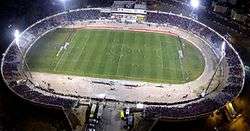
Since its inception in 1949, the club Hapoel Be'er Sheva eroded played in 3 different plots, starting out playing on the soil surface at the stadium which was located in the old city.
In 1959, the municipal stadium was built and inaugurated in Be'er Sheva on 31 October 1959 in a festive Hapoel Be'er Sheva against Hapoel Tel Aviv. In December 1988 ended in a major overhaul of the stadium, the contribution of Mrs. Lilly Friedman-Vasermil, and his name was converted to the stadium Arthur Vasermil. Ms. Friedman-Vasermil perpetuated by her son, who was murdered in the Holocaust by the Nazis, in 1943, Majdanek extermination camp, at the age of seven.
In 1995, in honor of her portrayal of Hapoel Beer Sheva in front of a group of Barcelona UEFA Cup, the stadium was renovated and installed at the bleachers plastic seats instead of exposed concrete.
In 2009 the rest of the seats were installed in the galleries, following the return of Hapoel Beer Sheva Premier League.
On 30 May 2015 Played in Vasermil Stadium last game, which increased Hapoel Be'er Sheva 0–4 on the team Beitar Jerusalem. The home stadium of Hapoel Be'er Sheva today is Turner Stadium named after Jacob Turner.
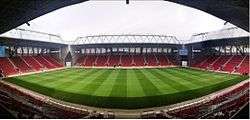
Compound Vasrmil
Be'er Sheva Municipality decided during 2015 to commemorate the legendary stadium named Arthur Vasermil that carries on a meaningful story.
This compound serves mainly the youth department groups Hapoel Be'er Sheva, But sometimes even the older group.
Compound five training facilities that includes a field with artificial turf as required by FIFA.
In 2013 the building was inaugurated "at the Association", the project includes 750 square meters of computer rooms, professional spaces, dressing rooms, doctor's room, coaches room, an area for gatherings, logistics and other rooms with modern elements of the most advanced in the country and meets all the standards of the Israel Football Association Premier leagues. there is a possibility to build another floor to the club in the future, to continue activities such as football academy construction project.
Fans
Crowds of Hapoel Be'er Sheva spread throughout the country and is one of the largest audiences in Israel.
The crowd 2012/2013 season won the title of Be'er Sheva year's fair audience. In recent years, won the audience Be'er Sheva fans highly praised by Israeli sports media encouraging the highest level observed.
Fans Association – Vasermilya
The association was established in early 2013 and approved by the Registrar of associations, the name "Vasermil" was chosen to preserve and remember the name of the late Arthur Vasermil, a Jewish boy who perished in the Holocaust and was named the stadium accompanied the group throughout the years and was the home of football fans in the city.
The aim of the association is to represent the community of fans of Hapoel Be'er Sheva, and a battle between the fans, the players and the professional staff to strengthen the familiarity between them, and that the association maintains the tradition of the club while preserving the interests of the club. In addition, the association works to eradicate violence and racism lots cooperate fully with the fans and the club management.
The association works regularly since its inception in social networks, and can be found on Facebook, Twitter and Instagram, the association sends information including news, photos, events of the association and a real-time update on the results of games. In addition, the Association of South radio show fans as the "voice in the stands", and Android App Store and the Ap named Vasermil.
Ultras Organization – UltraSouth
Fans Organization was founded in 2014 after reunion by two organization named TheCamels and The SouthSide.
The main idea was to unite all organizations through the years in to one ultras organization.
The principal activity was concentrated at the gate 5 in Vasermil stadium, the organization settled in the south gate of the new stadium.
The organization's goal is to Worry to decor in the Stands To create a pleasant atmosphere with free fruit for all and quality.
The organization takes care to make flags and signs in high-level deployment to increases in the standard of decor in the stands, and songwriter for the group and for the players. In addition, the organization is in regular contact with the fans by Facebook.
Club crest and colours
- Club crest

With the establishment of the club, it was decided by the management team jerseys placed on the crest labeled Hapoel Be'er Sheva with below, this symbol has served the club until 1993.
In 1993 the club management decided to change the group crest, and because, over the years earned the club the nickname "Camel" club tried to create a symbol for it. Between 1993 and 1995 modified camel hump crest below it operates and soccer ball in the center circle and the edges team name written in Hebrew and English.
From 1995 to 2016, Hapoel Be'er Sheva flaunted symbol lower half half a soccer ball, and the top half contains a chimney symbolizes the municipal building, a symbol of the original verb, and slogan "the pride of the Negev" to describe the team from the capital of the Negev.
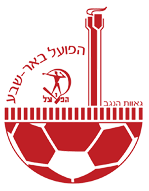
On 21 June 2016 the club's management presented the official emblem in the presence of the press conference season 2016/2017. Current symbol based on the symbol which served the club until season 1995/1996 season 2015/2016, as is shown in the lower half circle shape half a soccer ball, and the top half contains a chimney symbolizes the municipal building, a symbol of the original executive, the top edges of the circle is displayed with the name the club's Hebrew and English. In addition, the crest is displayed above the round star, this star represents the club won championships.
- Colour
| Type | Shirt | Shorts | Socks | First appearance / Info | Club Crest |
|---|---|---|---|---|---|
| Home | Red | White | White |  H.Be'er Sheva crest from 2016 | |
| Away | White | White | White | ||
| Away Alt. | Red | Red | White | ||
| Third | Blue | Blue | Blue |
Kit manufacturers and sponsors
Kit manufacturersColor shirt and trousers of Hapoel Be'er Sheva had since its inception red and white, the group's third costume is blue. At times over the years some more pretty black hue group, and the famous shirt design club are red and white striped care first and second championship. The uniform of the team began the season 2016/2017 are the puma company, over the years, Hapoel Be'er Sheva adopted by Kappa, Adidas, Nike, Diadora, Lotto and Umbro. Here are manufacturers of team uniforms starting in 1975
SponsorsSince its inception Hapoel Be'er Sheva has worked with a number of sponsors recognized locally as Solel Boneh in the eighties, and the South Korean car company Kia and Forum Club at the beginning and middle of the decade. 2016 main sponsor is Tadiran. Sponsors secondary Hapoel Be'er Sheva include the company Giggsi, Metropoline, Avisror Moshe and Sons, Briuta, Gadot chemicals, Wabi, Fattal Hotels, Ofakim Travel and Tourism, Delta and Shefa Hafakot. Here are the main sponsors of the team from 2012
|
Honours
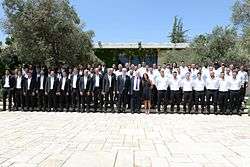
- Premier League:
- Second League:
- State Cup:
- Super Cup:
- Super Cup (Second League):
- Winners (1): 1970–71
- Toto Cup:
- Toto Cup (Second League):
- Lilian Cup:
Record in Europe
As of 28 September 2016:
| European plant | P | G | W | D | L | GP | GN |
|---|---|---|---|---|---|---|---|
| UEFA Champions League / European Cup | 1 | 6 | 3 | 2 | 1 | 8 | 7 |
| UEFA Europa League / UEFA Cup | 5 | 13 | 3 | 3 | 7 | 11 | 23 |
| UEFA Cup Winners' Cup | 1 | 4 | 1 | 1 | 2 | 3 | 15 |
| UEFA Intertoto Cup | 3 | 12 | 4 | 4 | 4 | 19 | 20 |
Meetings in Europe
| Season | Competition | Round | Club | Home | Away | Aggregate |
|---|---|---|---|---|---|---|
| 2016–17 | UEFA Champions League | 2Q | 3–2 | 0–0 | 3–2 | |
| 3Q | 1–0 | 0–0 | 1–0 | |||
| PO | 2–0 | 2–5 | 4–5 |
| Season | Competition | Round | Club | Home | Away | Aggregate |
|---|---|---|---|---|---|---|
| 1994–95 | UEFA Cup | PR | 1–2 | 1–3 | 2–5 | |
| 1995–96 | UEFA Cup | PR | 2–0 | 1–0 | 3–0 | |
| 1R | 0–7 | 0–5 | 0–12 | |||
| 2014–15 | UEFA Europa League | 2Q | 0–0 | 1–2 | 1–2 | |
| 2015–16 | UEFA Europa League | 2Q | 1–1 | 1–2 | 2–3 | |
| 2016–17 | UEFA Europa League | Group K | 3–2 | 2–0 | ||
| 0–0 | - | |||||
| 0–1 | 0–2 |
| Season | Competition | Round | Club | Home | Away | Aggregate |
|---|---|---|---|---|---|---|
| 1997–98 | UEFA Cup Winners' Cup | QR | 2–1 | 0–0 | 2–1 | |
| 1R | 1–4 | 0–10 | 1–14 |
| Season | Competition | Round | Club | Home | Away | Aggregate |
|---|---|---|---|---|---|---|
| 1976 | UEFA Intertoto Cup | Group 2 | 3–3 | 1–5 | 3rd[2] | |
| 0–0 | 1–3 | |||||
| 2–1 | 1–1 | |||||
| 1994 | UEFA Intertoto Cup | Group 2 | - | 1–0 | 2nd[3] | |
| 1–3 | - | |||||
| 1–1 | - | |||||
| - | 6–1 | |||||
| 2004 | UEFA Intertoto Cup | 1R | 0–3[4] | 2–1 | 4–2 |
Current squad
- As of 26 June 2016
Note: Flags indicate national team as defined under FIFA eligibility rules. Players may hold more than one non-FIFA nationality.
|
| ||||||||||||||||||||||||||||||||||||||||||||||||||||||||||||||||||||||||||||||||||||||||||||||||||||||||||||||||||||||||||||||||||||||
Retired numbers
- 6
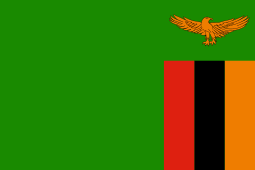 – Chaswe Nsofwa, Striker
– Chaswe Nsofwa, Striker
Out on loan
Note: Flags indicate national team as defined under FIFA eligibility rules. Players may hold more than one non-FIFA nationality.
|
|
Foreigners 2016–17
Only up to Six non-Israeli nationals can be in an Israeli club squad (only five can play at the same time). Those with Jewish ancestry, married to an Israeli, or have played in Israel for an extended period of time, can claim a passport or permanent residency which would allow them to play with Israeli status.
Professional staff
.jpg)
| Position | Staff |
|---|---|
| Head coach | |
| Assistant coach | |
| Goalkeeping coach | |
| Fitness coach | |
| Fitness coach | |
| Mental Consultant | |
- Last Updated: 30 May 2016
Coaches
| To hide click on → | |||||||||||||||||||||||||||||||||||||||||||||||||||||||||||||||||||||||||||||||||||||||||||||||
|---|---|---|---|---|---|---|---|---|---|---|---|---|---|---|---|---|---|---|---|---|---|---|---|---|---|---|---|---|---|---|---|---|---|---|---|---|---|---|---|---|---|---|---|---|---|---|---|---|---|---|---|---|---|---|---|---|---|---|---|---|---|---|---|---|---|---|---|---|---|---|---|---|---|---|---|---|---|---|---|---|---|---|---|---|---|---|---|---|---|---|---|---|---|---|---|
|
| ||||||||||||||||||||||||||||||||||||||||||||||||||||||||||||||||||||||||||||||||||||||||||||||
Notable players in club history
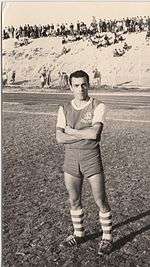
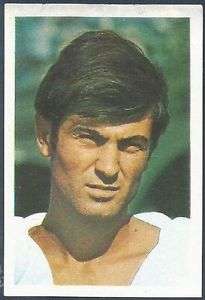
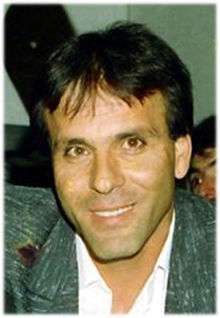
Youth department
Hapoel "three" Be'er Sheva, which represents the country's main southern football, and one of the largest youth departments in Israel.
Groups of youth department
Professional director of the Youth Department: Sharon Avitan
| Team name | League | Head coach |
|---|---|---|
| Hapoel "three" Be'er Sheva | Youth Premier League | |
| Hapoel Be'er Sheva | Boys Alef Premier League | |
| Hapoel Be'er Sheva | Boys Bet Premier League | |
| Hapoel Be'er Sheva | Boys Gimel Premier League | |
| Hapoel Be'er Sheva | Children Alef Center Premier League | |
| Hapoel Be'er Sheva lavan | Children bet Center Premier League | |
| Hapoel Be'er Sheva | Children bet coastline plain Premier League | |
| Hapoel Be'er Sheva | Children Gimel Center Premier League | |
Honours
- Youth Israeli champions:
- Winners (4): 1969–70, 1973–74, 1975–76, 1984–85
- Youth Super Cup:
- Winners (1): 1984–85
Youth team
Note: Flags indicate national team as defined under FIFA eligibility rules. Players may hold more than one non-FIFA nationality.
|
|
References
- ↑ "Profile of Hapoel Be'er Sheva in UEFA". Uefa. Retrieved 30 May 2016.
- ↑ "Table to the UEFA Intertoto Cup 1976 season". Mogiel. Retrieved 4 April 2016.
- ↑ "Table to the UEFA Intertoto Cup 1994 season". Mogiel. Retrieved 4 April 2016.
- ↑ (Hebrew) "Technical loss to Hapoel Be'er Sheva in Intertoto Cup". Ynet. Retrieved 4 April 2016.
External links
| Wikimedia Commons has media related to Hapoel Be'er Sheva F.C.. |
- Hapoel Be'er Sheva Israel Football Association